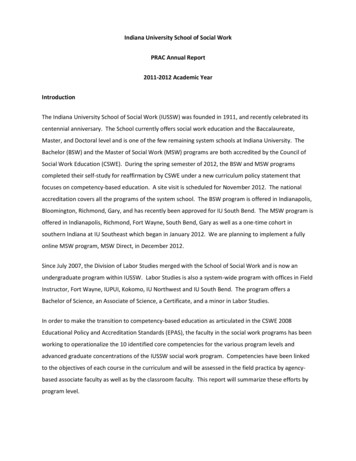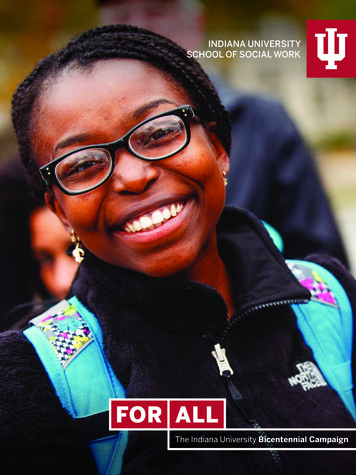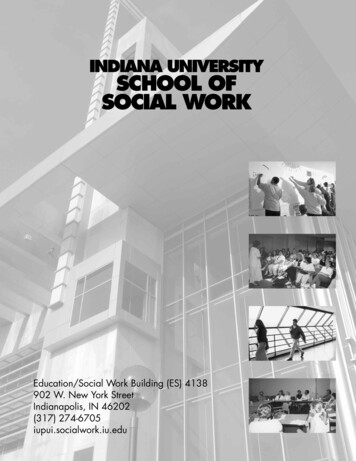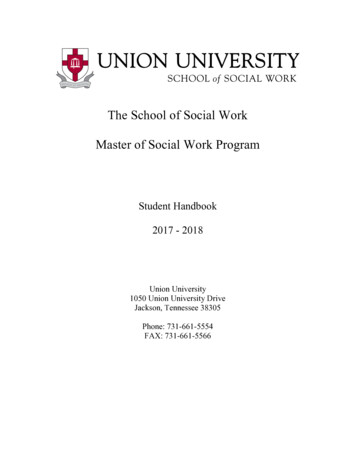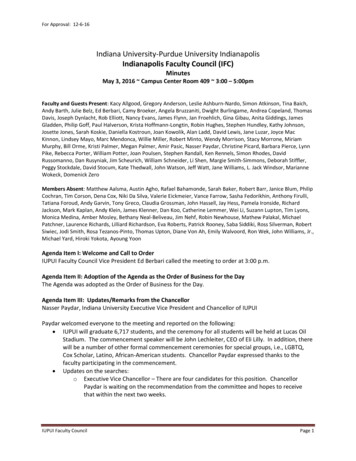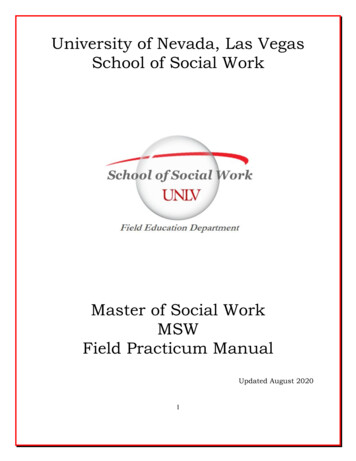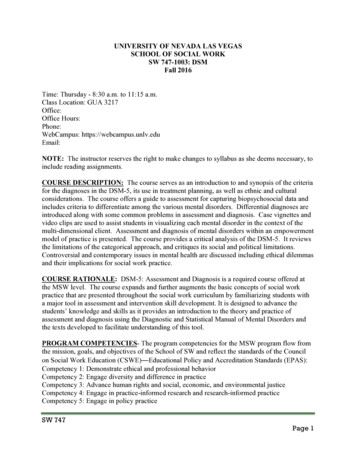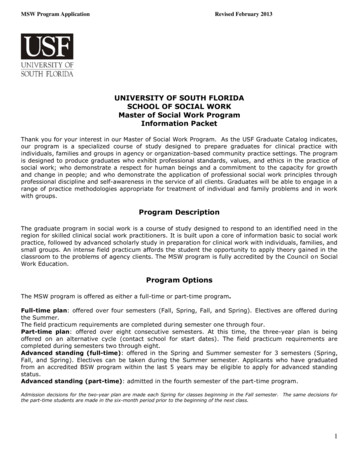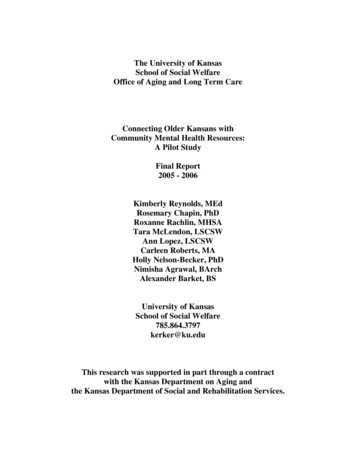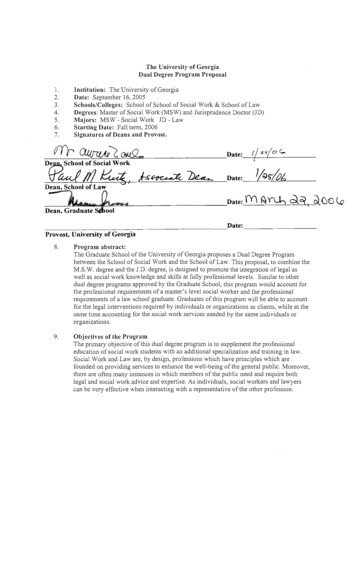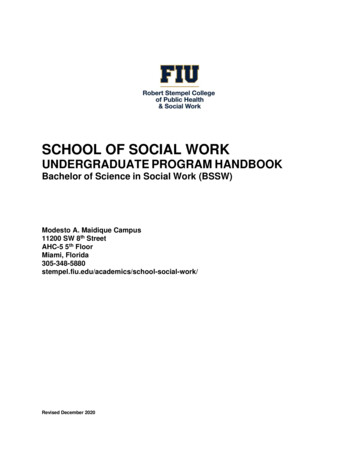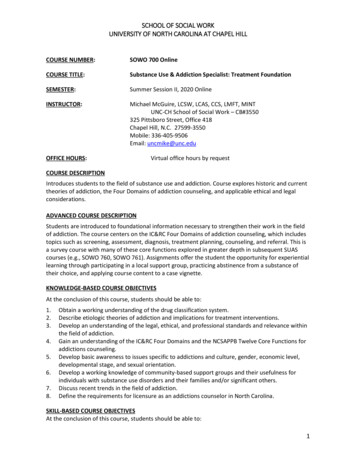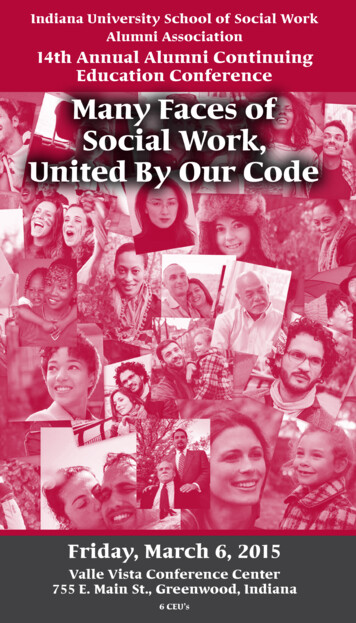
Transcription
Indiana University School of Social WorkAlumni Association14th Annual Alumni ContinuingEducation ConferenceMany Faces ofSocial Work,United By Our CodeFriday, March 6, 2015Valle Vista Conference Center755 E. Main St., Greenwood, Indiana6 CEU’s
Many Faces of Social WoValle Vista Conference Cen8:30-9:00 a.m.Registration9:00 a.m.Welcome IUSSWAA PresidentKjirsten Kmetz andDean Michael Patchner9:15-10:45 a.m.KeynoteAdvocating Policy: Applying the Code of Ethics Along theContinuum of Social Work Practice (worth 1.5 hours ofethics)Heather McCabe, MSW, JDSocial workers are often asked to consider the ethics ofworking with their clients in a therapeutic relationship.Here we will discuss the implications of ethics workingalong the full continuum of social work – from micro tomacro. How do ethics look when working withcommunities? What ethical obligations do socialworkers have to work for social justice when workingone on one with clients? Join us for an interactivepresentation on these and other topics of ethics!11:00 a.m. – 12:30 p.m. Breakout Session One Working with Transgender Men and WomenShannon Woller, Psy.D, ABPP, HSPPTransgender men and women are a grossly underservedpopulation within the United States healthcare systems.Although underserved, transgender men and women areat increased risk for psychiatric disorders, self-harm, andsuicide attempts. Culturally sensitive care is an importantskill for any practitioner who encounters transgenderpeople in their clinical practice. Attendees will beintroduced to appropriate terminology to use withtransgender patients, to the differences betweentransgender, cross-dressing, and intersex conditions,and to some of the many ethical and practical concernsthat arise when working with this group. Attendees willbe educated on the WPATH standards for medical andpsychiatric care of transgender patients as well. A caseexample will also be discussed to illustrate the oftencomplex nature of transgender clients. Classifying High Risk Behavior: A Review of the SelfDirected Violence Classification SystemTravis Field, LCSW, MA, MSWThe Self-Directed Violence Classification System,developed by the Centers for Disease Control (CDC) andthe Department of Veterans Affairs (VA), was developedto provide clinicians with a standardized language(nomenclature) to use when they are working withclients who are experiencing thoughts of self-directedviolence or have engaged in self-directed violentbehaviors (either suicidal or non-suicidal). In its presentform, the Classification System is not by itself a suiciderisk assessment instrument; however, it provides astandardized language that may assist clinicians inaccurately identifying and documenting high risk ideationor behavior, equipping the clinician with specificdefinitions and teams to describe and document aclient’s high risk behavior.At the end of the session attendees will:understand the importance of using a standardizedlanguage (nomenclature) to differentiate andcommunicate both suicidal and non-suicidal ideation andbehavior during a client assessment. understand how touse the Self-Directed Violence Classification Systemclinical tool. Death and Bereavement: Somebody’s Gotta Talk About ItCourtney Sutliff, MSW, LCSW, ACHP-SWParticipants will be able to identify the needs of a dyingor bereaved client. Participants will be able to identifycommon signs of a typical grief response. Participantswill explore methods for assessing for risk ofcomplicated grief. Participants will gain anunderstanding of collateral grief experienced by helpingprofessionals and how it impacts both one’s personaland professional life. Participants will explore methodsfor managing the impact of grief and loss beyondstandard self-care. Navigating the Systems Maze: Supports and Services forIndiana Children and Youth with Special Health CareNeeds and DisabilitiesRylin Rodgers, BAFamilies raising children who have special health careneeds encounter a maze of systems and services as theyseek to support their child’s growth and development.Rylin Rodgers will share lessons learned from navigatingthis maze, first for her own children and now for familiesthroughout Indiana and beyond. Participants will learnabout the current status of key systems, navigationstrategies, and the impact of family and professionalpartnerships advocating for systems. The Rodgers’sfamily experience will provide a frame to consider need,values, strengths and challenges.12:30–1:30 p.m.Lunch1:30–3:00 p.m.Breakout Session Two Challenges in Family Therapy with Delinquent and SexuallyAbusive YouthHugh Hanlin, Ph.D., and Amanda Pryor, LCSWThis workshop helps therapists develop decision-makingskills for highly challenging family therapy sessions. Theworkshop asks selected participants to engage in ascripted role-play of family sessions with the presenteracting as the therapist. The teaching method is to conduct“slow motion” family sessions with frequent “freezes” todiscuss what the therapist might do next. The discussionprovides direction to the therapist (presenter) on the nextstep in the family session. The therapist tries theintervention and workshop participants evaluate theoutcome, make suggestions, and discuss interventions touse. The participants achieve the learning objectives fromthe interaction among participants and the presenters. Thepresenters challenge assumptions and encouragediscussions among participants. Specific techniques arisefrom the discussion and their use clarified. The familysessions address issues related to delinquency, trauma,and family dynamics. The format is interactive rather thandidactic. PTSD-Families-Addictions and Spirituality: The CommonThread? Back by Popular DemandDr. Clyde Angel and Professor John SullivanThe word Disorder in PTSD stands for Disorder ofRecovery which raises the question:
ork, United By Our Codenter Friday, March 6, 2015 What is the disorder? One explanation is that it is aDisorder of Recovery from the symptoms (by products)of trauma. These symptoms (by-products) impact and disrupt:1) Families - shattered trust and loss of intimacyerodes the element of bonding essential to healthyrelationships and leads to dysfunctional behaviors2) Healthy Living - the emotional and existential painuntreated promotes self-medication of symptomswhich often results in addiction3) Self-esteem and Contentment - The individual’sconnection with SELF, their Higher Power or theSacred, family, community, and nature are indisorder or in conflict.These three areas of life that are impacted and disruptedneed to be addressed in a holistic approach to the processof Recovery. Our presentation will describe the dynamicsof disruption in each area and will propose approaches totreatment. CareAware Options for Social Workers Engaging andSupporting Family Caregivers for Optimal Client OutcomesKate Kunk, RN, CIRS-A,As we observe the 65 population doubling by 2030, wealso acknowledge that the risk for catastrophic illness andthe cost of healthcare increase with age. While urgentlyseeking appropriate responses to the growing needs ofthis population, it is essential that we develop a morecomprehensive, community-based care team that includeshealthy, informed and engaged family caregivers as thebackbone for successful care to prevent premature andunnecessary institutionalization.At the close of this session, attendees will be able to:1. Identify the extreme social and economic contributionsof engaged family caregivers and the necessarycaregiver supports to ensure best client outcomes.2. Define the successful community-based care team asa composite that includes family caregivers and otherlesser-considered entities.3. Articulate barriers to caregiver engagement on theteam, as well as the steps necessary for overcomingthem. Dismantling the Pipeline to Prison Phenomenon for Indiana’sChildrenSheila Dennis, MSW, and Anita Osborn, MSWIndiana ranks 2nd in the nation for out-of-schoolsuspensions of African American children. Zero tolerancepolicies create a culture of educational exclusion with adirect correlation to incarceration. As inequitableeducation is a civil rights violation, the US Department ofJustice is pursuing the imperative for equal access toeducation for all children. Through a multi-systemicpartnership, Children’s Policy and Law Initiative (CPLI) is acoalition of community service providers, stakeholders,and families who seek to reshape Indiana’s juvenile andeducational laws, increasing children’s access toeducation and reducing the likelihood of incarceration.Participants will examine research that illuminatesdisproportionality and institutionalized racism in disciplinepractices as well as discuss how trauma impacts learningand leads to misdiagnoses and exclusionary discipline.The session will also include a discussion on how schoolsocial workers are central to supporting positive schoolclimates but are a rare resource in Indiana schools.Participants will leave the session with knowledge andskills to support positive school climates through policychange at the state level and best practices with traumainformed care at the direct service level.Attendees in this session will gain:1. An increased understanding of the current Pipeline toPrison phenomenon in Indiana;2. Research-informed knowledge on how zero toleranceand exclusionary discipline policiesdisproportionately impact children of color;3. Enhanced insight into how macro systems, such aschild welfare, juvenile justice, mental health, andeducation, are partnering to change Indiana’s zerotolerance educational and juvenile crimelawsthat perpetuate the Pipeline to Prison issue;4. Awareness of the emerging neuroscience of trauma;5. Knowledge on how trauma impacts a child’s ability tolearn; and6. Skills with assessing and intervening with childrenand families who have experienced trauma.3:15 – 4:45 p.m.Breakout Session Three Incorporating Sexuality into Social Work PracticeRichard A. Friedman, MSW, LCSW, LCACCultural competency requires that social workers beeducated about social diversity and how their own andsocietal attitudes and beliefs affect the lives of others in avariety of cultural contexts. Shifting terminology and selfidentifications among those who identify as other thanheterosexual can cause confusion among social workerseven when they have the best of intentions. Thispresentation is designed to help social workers examinetheir own preconceptions relating to non-heterosexualindividuals and the place of sexuality in the lives ofindividuals and families. Discussion will focus on theculture surrounding non-heterosexuality, the history of gayand lesbian rights, the different ways in which nonheterosexuality has been conceptualized and the currentlegal status of non-heterosexual family relationships.Afterwards, several practice scenarios will be utilized tohighlight the myriad impacts that non-heterosexuality canhave for individuals at micro- and mezzo-levels. DISCOVERING THE SUPER HERO WITHIN: Post TraumaticGrowth and ResilienceGeri Waggle, MSW, LCSWCrisis and trauma have the potential to transformindividuals in positive ways. Current research is providingpowerful proof that we are wired to grow in the wake oftragedy and crisis. Social workers will learn about apositive mental health topic: “Post-Traumatic Growth”(PTG) the phenomenon of individuals becoming strongerand creating a more meaningful life in the wake of tragedyor trauma. Social Workers will learn ways to help theirclients reframe their past, recognize their uniquestrengths, and develop a core of resilience leading to ahappier and healthier existence. In the words of NelsonMandela, “The greatest glory in living lies not in neverfalling, but in rising every time we fall.”
Supervision: Enhancing Clinical, Case Management andVisitation Facilitation Skills in Home-Based PracticeLaura Green, MSW, LCSW, CSAYC, and Carissa Cullumber,MSW, LCSW, CSAYCThis workshop will address creative and unique ways toprovide supervision for home-based clinicians, casemanagers and visitation facilitators. Particular focuscenters on energizing seasoned staff and engaging andretaining new staff. This workshop will also explore theconcepts of using a management team approach toprovide up to date interventions and treatment strategiesto clinicians, case managers and visitation facilitators. Crisis Intervention in Violent TimesKim Walton, MSN, APRN, and Rev. Gerry GriffithA police officer is killed responding to a domesticviolence call. Another officer killed in the line of dutyresponding to shots fired when he approaches a groupof people in an alley. Earlier that day six men and awoman were shot in a popular downtown bar and then ayoung mother is murdered and then the father commitssuicide in front of small children. The caregivers in ourcommunity need tools to respond to those impacted bythe violence in our community. This session will focus ondeveloping tools to plan a community crisis responsethat will support caregivers and those impacted byviolence. Participants will be able to understand how the brainresponds to traumatic events. Participants will learn about immediate and long-termcrisis reactions. Participants will understand the fundamentals oforganizing a crisis intervention. Participants will receive tools for understanding andresponding to underserved populations such asMeet the SpeakersDr. Clyde Angel, BA, DMin, has been the Chief ofChaplain Services at the Richard L. Roudebush VAMedical Center since November 2008. He began hiscareer as a VA chaplain in Atlanta, Georgia in 2006.Chaplain Angel received his bachelor’s degree fromCarson-Newman College, Jefferson City, Tennessee, in1981. He completed a Masters of Divinity and a Doctor ofMinistry degree from The Southern Baptist TheologicalSeminary in Louisville, Kentucky. Chaplain Angel is aveteran of the US Army and currently works extensivelywith Veterans in relation to Post Traumatic StressDisorder and Substance Abuse in addition to hisadministrative responsibilities as director of the ChaplainService Department at the Indianapolis VA MedicalCenter.Carissa Cullumber, MSW, LCSW, CSAYC, is a trainedfamily therapist specializing in the treatment of childrenwho have been sexually abused, youth with sexuallymaladaptive behaviors and trauma informed care. Ms.Cullumber is credentialed with IN-AJSOP, IndianaInitiative to Advance the Treatment of SexuallyMaladaptive Youth. Ms. Cullumber provides supervisionto therapists and case managers employed with FamilyWorks, Inc. in Indianapolis, as well as direct services tofamilies involved with DCS and Juvenile Probation. Ms.Cullumber also assists with training therapists in the twoyear marriage and family training program.Sheila Dennis, BSW, MSW, is currently serving on thefaculty of Indiana University School of Social Work,specializing in experiential education in schools and childwelfare. Possessing a BSW, MSW, and pursuing a PhD insocial work, Sheila’s educational focus has beenanchored in the social work profession. Since 2004,Sheila has taught social work courses and facilitatedfield education at Indiana University, Anderson University,and Royal Holloway University of London, where she alsoreceived a Postgraduate Certificate in Teaching andLearning. Sheila currently is an advisory board member ofthe Children’s Policy and Law Initiative for which she isleading the charge to engage families in the policy reformprocess. Her research interests include the epistemologyof social work assessment and equitable schooldiscipline.Travis Field, LCSW, MA, MSW, is a Licensed ClinicalSocial Worker at the Richard L. Roudebush VA MedicalCenter in Indianapolis. He has a master of arts degreefrom Southwestern Baptist Theological Seminary and amaster of social work degree from the Indiana UniversitySchool of Social Work. Since 1997, Travis has worked inthe mental health field, including three differentCommunity Mental Health Centers. For the past 9 years,he has worked at the VA: 4 years working as anoutpatient mental health therapist for returning Iraq andAfghanistan combat Veterans, and for the past 5 yearshas worked in the role of Suicide Prevention Coordinatorand Supervisory Social Worker.Richard A. Friedman, MSW, LCSW, LCAC, is a doctoralstudent at the Indiana University School of Social Work.He has previously worked as a therapist for a foster careagency and a case manager for several communitymental health agencies, is trained in trauma-informedcare and has received advanced training on attachmentbuilding interventions. He is currently a Social WorkFellow for the Leadership Education in Adolescent Healthat IUPUI and has recently presented at severalconferences at the state, national and international level.His research and practice interests include the formationof identity in GLBTQ adolescents and youth in foster care,interventions with hard-to-reach youth and the navigationof social versus intrapersonal identities.Laura Green, MSW, LCSW, CSAYC, CAC, is the ExecutiveDirector of Family Works, Inc. She provides clinicalsupervision and trainings for the family therapists andcase managers of Family Works, Inc. Ms. Green is atrained family therapist with specialized training in thearea of sexual abuse, including training at the KempeChildren’s Center, Denver, CO. Her areas of expertisefocus on adolescent males who have sexuallymaladaptive behaviors. She is credentialed with theIn-AJSOP, Indiana’s initiative to Advance the Treatment ofSexually Maladaptive Youth. She provides training forclinicians in the process of obtaining credentialingthrough IN-AJSOP. Ms. Green has worked extensivelywith families who have experienced abuse or neglect.She has trained and presented at the local, national andinternational levels. Ms. Green specializes in the area ofclinical supervision and continues to supervise clinicalstaff in her role as Executive Director.Rev. Gerry Griffith is a Chaplain with the Hamilton CountySheriff’s Department. Her first crisis response was intoOklahoma City, and as a member of the Indiana CrisisAssistance Response Team, was deployed twice to NewYork City following the attacks of 9/11. She was part ofthe founding Board of Directors for Brooke’s Place for
Grieving Children in Indianapolis where she facilitatedgrief groups for 3 – 5 year old children. She coordinatedProject Aftermath, the mental health response for floodvictims, following flooding in Indiana after developing acompanion program for flood victims through the IndianaNOVA (National Organization for Victim Assistance,Washington, DC) response to two flood disasters in 2007.She responded to San Diego with a NOVA team followingthe wild fires and taught the companion program to faithbased communities and other caregiver groups notserved by a local NOVA Team. She is a member of thenational response team for NOVA and a NOVA trainerand Certified Crisis Responder. She is a past president ofthe Board for the Indiana Crisis Assistance ResponseTeam and served as co-coordinator for their responsesfor several years. She is CISM trained and also a certifiedField Traumatologist with Green Cross. She respondsduring community and school crisis events.Hugh Hanlin, PhD, is a licensed psychologist with over 30years of experience with youth and their families. Hiswork experience include corrections, outpatient, homebased, and residential services. Currently, he is in privatepractice providing consultation, supervision,assessments, and therapeutic services. His specialty isworking with adolescents and families addressing issuesof sexually maladaptive behavior, trauma, anddelinquency.Kate Kunk, RN, CIRS-A, coaches family caregivers ofaged and disabled Hoosiers throughout eight counties ofCentral Indiana as Caregiver Options Counselor for CICOAAging & In-Home Solutions. Kunk holds degrees innursing and sociology. Before joining CICOA, her skills inadvocacy have taken her from homeless shelters in NewYork City and Virginia’s Roanoke Valley to a ps
Sheila Dennis, MSW, and Anita Osborn, MSW Indiana ranks 2nd in the nation for out-of-school suspensions of African American children. Zero tolerance policies create a culture of educational exclusion with a direct correlation to incarceration. As inequitable ed
